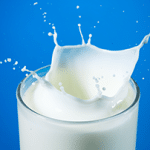Are you confused about how much protein your body needs each day to maintain your lean muscle mass? You are not alone here if you answered yes. To go back to the basics, protein is one of the three macronutrients or a major nutrient that your body needs to support health and wellbeing. Protein is needed to build and repair all the cells in your body and helps you maintain a healthy body weight.
Most people need 70-120% of their overall body weight in protein (in grams) to meet their daily needs, so if you weigh 60kg you need 42-72g over a day.
To maintain your lean muscle mass, you need to make sure that you are feeding your muscles enough protein over a day. To do this aim to include 20-40g of protein per meal and 10-15g of protein per snack as a guide.
If you are training multiple times a day, giving your body protein within one hour of training is recommended. A quickly absorbed protein to promote muscle synthesis and repair is preferred if possible. Using a protein shake can be a convenient way to provide your body with its needed protein for muscle protein synthesis and repair. Whey Protein Isolate, also known as WPI includes whey protein as a main ingredient and this type of protein is quickly absorbed. This rapidly digested protein will help to meet your protein needs around exercise to maximise your results from your training.
To increase your muscle mass your protein needs are dependant on how experienced you are in resistance training. Less experienced lifters need a smaller increase in protein at around 1.6g per kilogram of body weight compared to experienced lifters who can need over 2g of protein per kilogram of body weight.
To balance your other macros, as a general population guideline, for healthy individuals 45-65% of your diet should be made up of carbohydrates. Good sources of carbohydrates include wholegrains, dairy and fruit. 25-35% should be made up of fat. In the fat group no more than 10% should be saturated. Certain fats promote LDL cholesterol or ‘bad’ cholesterol such as saturated fat. In excess LDL cholesterol causes your arteries to begin to clog up which can lead to heart disease. Other fats like monounsaturated and polyunsaturated fats promote ‘good’ HDL cholesterol. This type of cholesterol takes cholesterol from your arteries back to the liver. Your liver then rids the cholesterol from your body. This helps to keep your heart healthy. Healthy fats can come from foods such as extra virgin olive oil, nuts, seeds, avocado, and fatty fish like salmon and sardines.
Looking specifically at protein, here are some examples of foods and beverages (along with serving sizes) which will give you 10g of protein:
- 2 eggs
- 85g firm tofu
- 40g of cheddar cheese
- 45g white fish
- 200g reduced fat yoghurt
- 300mL reduced fat soy milk
- 200g baked beans
- 3 slices of wholemeal bread
- 100g muesli
- 60g (2 small handfuls) of cashews
An example of what this could look like as meals and snacks over a day:
Breakfast
200g baked beans on 2 slices of wholegrain toast with some low-fat cheddar cheese (30g of protein)
Snack
200g of low-fat yogurt with half a cup of berries or a small piece of fruit (10g)
Lunch
2 slices of wholemeal bread with a tin of salmon in spring water (100g) with a cup of salad. (30g)
Snack
2 Weet-bix topped with 30g 100% peanut butter and a banana (13g of protein)
Post Gym Workout
A single serve of Grass-Fed Whey Protein Isolate provides (~26.4g protein depending on brand)
Dinner
½ cup of whole grain pasta with 80g of chicken breast and a cup of stir-fried vegetables using 2 tsp of extra virgin olive oil (27g of protein)
Supper:
250mL of warm skim milk with some cinnamon (9.25g)
Total protein over the day: 145.65g
You can also create some of your favourite foods by adding protein powder to them! 180 Nutrition has various recipes online that you can refer to, my favourite being the chocolate avocado keto smoothie bowl recipe found here.
Take home message: Aiming for an overall balanced diet each day will set you up to easily achieve your daily protein needs. 180 Nutrition provides quality wholefood supplements with no fillers, no preservatives, and no sweeteners which help to meet any gaps that you may have meeting your protein targets.
References:
- Government A. Nutrient Reference Values for Australia and New Zealand Australia: Australian Government; 2017 [updated 02-04-2014. Available from: https://www.nrv.gov.au/chronic-disease/macronutrient-balance.
- Stewart R. The Handbook of Clinical Nutrition and Dietetics 4th ed. Australia: Dietitians Association of Australia; 2007. 248 p.163-180.
- Stark M, Lukaszuk J, Prawitz A, Salacinski A. Protein timing and its effects on muscular hypertrophy and strength in individuals engaged in weight-training. J Int Soc Sports Nutr. 2012 Dec 14;9(1):54. doi: 10.1186/1550-2783-9-54. PMID: 23241341; PMCID: PMC3529694.
Photography credit: Shaun Anthony Photography







